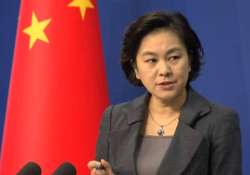Shanghai Cooperation Organisation admission a ‘major step forward’ for India, Pakistan: China
With India and Pakistan expected to join the Shanghai Cooperation Organisation (SCO) tomorrow, China today said it is a "major step forward" for both the South Asian countries to gain entry into the group and contribute to the region's prosperity and

Beijing: With India and Pakistan expected to join the Shanghai Cooperation Organisation (SCO) tomorrow, China today said it is a "major step forward" for both the South Asian countries to gain entry into the group and contribute to the region's prosperity and stability.
"This is a major step forward for India and Pakistan to obtain official SCO membership," Chinese Foreign Ministry spokesperson, Hua Chunying said.
"China supports India and Pakistan's accession to the SCO, and hopes that the entry of new members will contribute to the development of the SCO and regional prosperity and stability," she told PTI ahead of the SCO summit in the Uzbekistan capital Tashkent tomorrow.
Chinese President Xi Jinping who already arrived in Tashkent said the summit marks a new beginning for the group.
"China sees the 16th SCO Summit as a new starting point to enhance cooperation among members," Xi said as the six member group founded in 2001 is set to expand for the first time amid mixed feelings of optimism and skepticism about what impact India-Pakistan entry will have on the group considering their bitter rivalry.
SCO focussing mostly security related issues like terrorism in Central Asia is comprised of China, Kazakhstan, Kyrgyzstan, Russia, Tajikistan and Uzbekistan as full members.
Afghanistan, Belarus, India, Iran, Mongolia and Pakistan has observer status.
Last year's Ufa summit has formally adopted a resolution which started the procedures to admit India and Pakistan into the SCO.
It is not yet clear when the process for India and Pakistan admission into the group will be completed.
Both the countries have been asked to endorse all the documents of SCO since its founding in 2001.
Uzbekistan's Deputy Foreign Minister Anvar Nasirov has been quoted by Chinese state-run media earlier that that a Memorandum of Obligations by the Indian and Pakistani sides for obtaining SCO member state status will be signed during the Tashkent summit.
This is one of the important stages in the process of joining the organisation as a full member, he said.
"Observers are concerned about SCO expansion, especially the admission of India and Pakistan," an article in the state- run Global Times said earlier.
"The two nations, which are hostile over the issues of Kashmir and anti-terrorism, have long been locked into a state of military confrontation, and share conflicting views over the Afghanistan issue and other regional affairs," the article said.
"If Pakistan and India are admitted to the SCO at the Tashkent meeting, it will also help improve the ties between the two South Asian rivals, and thus contribute to peace and development in the subcontinent," an article in the state-run China Daily said.
The rise of terrorist groups in the Middle East, the Islamic State in particular, and the rampancy of the Taliban in Afghanistan and Pakistan pose real threats to Central Asia.
With the world intensifying its anti-terrorism campaigns, the possibility of IS terrorists fleeing or spreading out to Central Asia has become real.
Some terrorists returning from the Middle East have already been caught in Central Asian countries while trying to instigate terrorist attacks, it said.
Adding to the region's security concerns, the Taliban and some other terrorist groups are gaining ground in northern Afghanistan, it said.
The SCO meeting in Tashkent, therefore, has to provide some answers on how to deepen security cooperation among the member states in light of the new situation and security challenges in the region.
"By admitting India and Pakistan into the bloc, the SCO is facing up to the dynamics of the security threat in the broader Eurasian region," said Ye Hailin, researcher on South Asian issues at the Academy of Social Sciences.
"The group will be combating security threats like terrorism in a broader regional space," it said.
Mechanisms within the SCO have been created for joint anti-terrorism drills, securing international activities, intelligence exchanges, and joint work against cyber terrorism.
But more coordination and cohesion are needed, d Zhang Xinfeng, director of the Executive Committee of the SCO's Regional Anti-Terrorism Agency said.